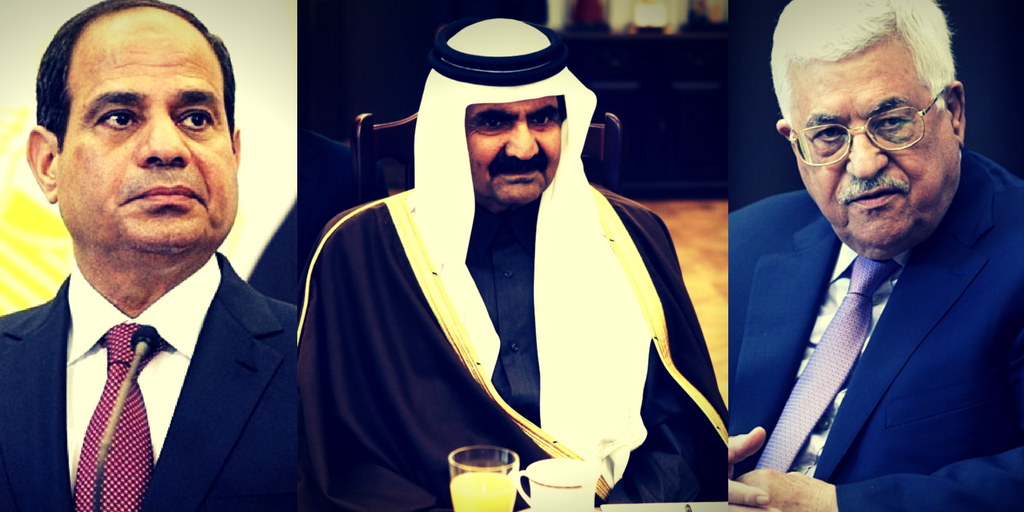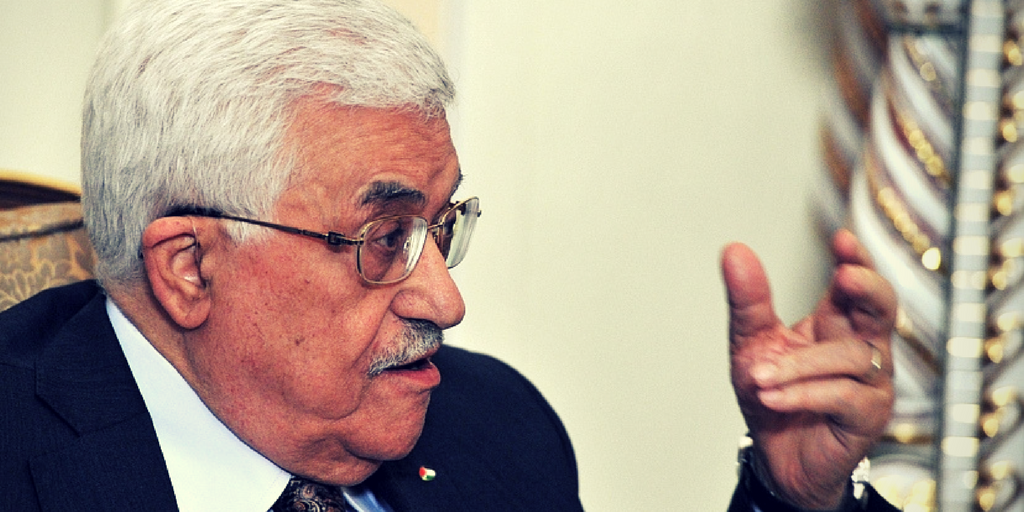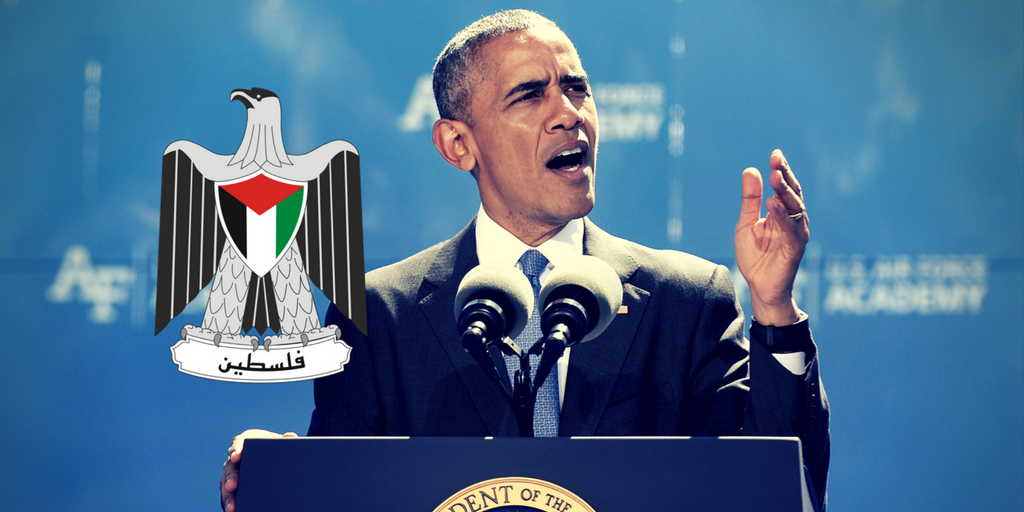The fact is that Trump has given Netanyahu support as he has walked away from the failed policy paradigm of the Obama years.
It may very well be that this week was the week that Israel and the US put to rest former president Barack Obama’s policies and positions on Israel and the Palestinians.
If so, the move was made despite the best efforts of Obama’s team to convince the Trump administration to maintain them.
The details of Obama’s policies and positions have been revealed in recent weeks in a series of articles published in Haaretz regarding Obama’s secretary of state John Kerry’s failed peacemaking efforts, which ended in 2014.
The articles reported segments of two drafts of a US framework for a final peace treaty between the PLO and Israel. The drafts were created in February and March 2014.
The article series is predicated on the assumption that Kerry and his team were on the precipice of a historic breakthrough between PLO chief Mahmoud Abbas and Prime Minister Binyamin Netanyahu. But a close reading of the documents shows that the opposite was the case.
There are two reasons that Kerry had no prospects for reaching a deal.
First, he, Obama and their advisers were too hostile to Israel and its citizens to ever convince Netanyahu that Israel’s interests would be secured.
A February 2014 draft framework agreement, which was based on conversations Kerry and his team held with Netanyahu and his advisers, makes this clear. The draft includes Netanyahu’s demand that Israeli communities in Judea and Samaria not annexed to Israel would remain “in place” after the implementation of a peace deal, and presumably, become towns in the future Palestinian state.
In other words, Netanyahu demanded that the Israelis in Judea and Samaria whose towns would be located in the territory of “Palestine” would enjoy the same rights and protections as Israel’s Arab citizens enjoy.
Kerry and his team would have none of it. The February draft agreement notes, “[US] negotiators need to check with PM [Netanyahu] on whether he wants to [maintain this position]… They believe that if so, he will push strongly for ‘in place.’ ‘In place’ is inconsistent with US policy and therefore unacceptable to us as well as the Palestinians.”
In other words, the position of the Obama administration was that all Israelis living in areas that would become part of the Palestinian state must be forcibly removed from their homes and communities.
Haaretz reporters Barak Ravid and Amir Tibon recalled that in previous rounds of negotiations, the Palestinians – unlike the Obama administration – had not rejected this Israeli position out of hand. That is, in demanding the mass expulsion of Israeli Jews from their homes, the administration adopted a policy more extreme than the PLO.
Then there is the problem with the PLO.
Abbas rejected Kerry’s February 2014 draft framework agreement, which was based on conversations with Netanyahu and his advisors. But he also rejected Kerry’s March 2014 agreement, which was based on the US’s conversation with him and his advisors.
The March 2014 draft was presented to Abbas by Obama himself during a meeting between the two in the White House. Not only did Abbas not accept Obama’s offer, he refused to respond to it.
This should have surprised no one. Abbas did the same thing in 2008 after then-prime minister Ehud Olmert presented Abbas with his peace proposal. Abbas’s predecessor, Yasser Arafat, responded in the same way in July 2000 to then-prime minister Ehud Barak’s peace offer, and in December 2000, to then-president Bill Clinton’s peace offer.
Given the consistent track record, it is beyond foolish to believe that anyone – even Trump – will fare differently from his American and Israeli predecessors.
Perhaps the most interesting aspect of the Haaretz series is what they tell us about Netanyahu.
Like him or hate him, the Netanyahu revealed in the articles is a brilliant statesman. In difficult diplomatic conditions, with the US openly siding with the PLO against him, Netanyahu managed to parry and duck. Although Haaretz tries to present Netanyahu as weak and compliant, the text shows that the opposite was the case.
In the face of massive pressure from Obama, Netanyahu refused to commit to anything. His only recorded position was that all Israeli communities in Judea and Samaria remain in place in perpetuity.
Rather than confront Kerry directly, Netanyahu stood aside and watched as the Americans drafted their anti-Israel proposals. He nodded. He smiled. He refused to commit to anything.
And he waited patiently for Abbas to walk away from the table.
Until this week, much to the dismay of many of his supporters, Netanyahu appeared unwilling to move beyond the defensive position he maintained throughout the Obama presidency. This week he took three great big steps forward.
First, Netanyahu announced that he supports amending Israel’s NGO law to ban foreign governments from funding political nonprofits registered in Israel.
For the past 20 years, Israel has been subjected to ever-escalating subversive campaigns funded and often directed by foreign governments and carried out by Israeli-registered NGOs. The purpose of these campaigns is to legitimize political and economic warfare against the Jewish state by European and other Western governments. The campaigns legitimize political and economic warfare against Israel by demonizing the Jewish state, its citizens and its soldiers.
In recent years, lawmakers have tried repeatedly to block the funding. But due to US pressure, Netanyahu scuttled all their attempts. Proposed reform bills were watered down until they were limited to instituting weak reporting requirements. Foreign government funds continue streaming into the coffers of NGOs whose positions are supported by no significant domestic constituencies.
By announcing that he now supports passing legislation that will bar foreign government funding of nonprofits, Netanyahu is striking a strategic blow at the political and economic war being waged against Israel by the EU and by the international Left.
This war, waged in the name of the Palestinians, has harmed Israel’s relations with the Palestinians by discouraging them from living peacefully with their Israeli neighbors.
Then there is UNRWA. The UN’s refugee agency dedicated to the Palestinians is arguably one of the central reasons for the perpetuation of the Palestinian conflict with Israel. Indeed, UNRWA was formed by the Arab governments to specifically block all prospect of peace between Israel and its neighbors.
UNRWA prevents the permanent resettlement of the Arabs who left Israel in 1948 and 1949 as well as their descendants. It has doomed five generations of “refugees” to live in the squalor of its camps, blocked from receiving citizenship in the countries of their birth and prevented from being resettled in other countries.
After Hamas took over Gaza in 2007, then-secretary of state Condoleezza Rice and then-foreign minister Tzipi Livni decided that the best way to respond to the move was by massively increasing UNRWA’s budget. They were unmoved by the fact that UNRWA employs Hamas terrorists. They ignored the fact that UNRWA schools in Gaza and elsewhere indoctrinate their students to embrace jihad and the cause of Israel’s annihilation.
Under Obama, the US increased its payments to UNRWA even as UNRWA schools, clinics and other facilities have been used as missile launching pads and storage depots in Hamas’s war against Israel.
This week, Netanyahu finally put to rest the dangerous folly that UNRWA is a foil to Hamas and a positive force in the region. He called for UNRWA to be dismantled and for the Palestinians and their descendants to be treated like every other refugee group in the world and be resettled by the UN’s high commissioner for refugees.
If Netanyahu’s move against UNRWA is translated into actual Israeli and US policy, it will mark the beginning of the end of one of the primary causes of the Palestinian conflict with Israel.
Finally, there is incitement. Palestinian terrorism would vastly diminish were it not for constant incitement that encourages terrorism and rewards and celebrates terrorists.
Since it was established by the Qatari regime in 1996, Al Jazeera has been a central engine of antisemitic and jihadist indoctrination of the Palestinians. And yet, Israel has never moved to close Al Jazeera’s bureau in Israel.
Israel has given the terrorist network a pass largely because it hasn’t wanted to deal with the Western outcry that such a move would provoke.
This week, for the first time, Netanyahu, along with Defense Minister Avigdor Liberman, announced they support Al Jazeera’s closure and have directed their staff to consider the best way to do so.
In so doing, Netanyahu and Liberman are making the most of the opportunity afforded Israel by the Arab states’ open cleavage with Qatar. Last week, Saudi Arabia and Jordan closed Al Jazeera’s bureaus in Riyadh and Amman. Egypt, which closed Al Jazeera’s offices in 2013, blocked its website.
Taken both separately and together, Netanyahu’s moves this week strike strategic blows at three central components of the Palestinian conflict with Israel. Incitement, political warfare and the eternalization of Palestinian refugee status all render the conflict intractable and prevent peaceful Palestinian leaders from emerging.
Notably, whereas the Obama administration would have subjected Israel to hysterical condemnations if Netanyahu had dared to take the steps he took this week, the Trump administration has taken no position on Netanyahu’s announcements.
The real reason that Trump appears to be burying Obama’s legacy is because unlike the ideologically- driven Obama, Trump is willing to consider evidence and facts when determining his opinions.
In May, Abbas came to the White House and told Trump that he abjured terrorism. Israel then presented Trump with evidence that Abbas publicly incites terrorism and uses the Palestinian Authority budget to support terrorists and their families.
Trump took in the information and upbraided Abbas for lying to him.
True, this week Secretary of State Rex Tillerson falsely told Congress that Abbas had cut off the payments. And true, Tillerson doubled down on his assertion after both the Palestinians and Israel said the payments have not been cut off.
True as well that Trump continues to believe that he can make “the deal” that his predecessors failed to secure.
But the fact is that Trump has given Netanyahu support as he has walked away from the failed policy paradigm of the Obama years.
In other words, Netanyahu’s moves this week, and the fact that the Trump administration has left him alone to make them without being second-guessed or condemned by Washington, indicates that we have finally moved past Obama’s legacy.
Where we are going is still unknown. But what is certain is that by going after the sources of the continued malignancy of the conflict and pushing back against the lies that informed Obama’s policies, both Israel and the US have abandoned them.
Originally published in Jerusalem Post






